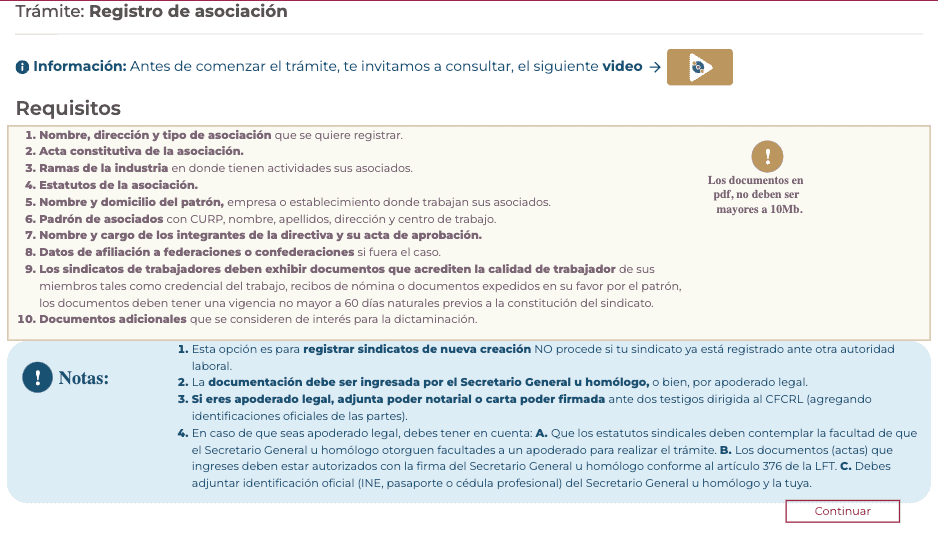Last updated on July 7th, 2024 at 08:45 pm
Labor unions in Mexico are one of the fundamental figures in Mexican labor laws. They are an organization of workers with its own legal identity, just like a company. This means they are a legal entity on their own. In Spanish, we called them collective persons.
The sole purpose of Mexican Labor unions is to defend workers’ rights. As we have explained several times throughout the blog, legislators wrote the constitution after the Mexican Revolution. This revolution happened mainly because of the social inequality that led to poor labor conditions in the country. Therefore, our Political Constitution establishes certain concepts like Mexican companies’ profit sharing, the Mexican minimum wage, and other mandatory employee benefits in Mexico.
The Mexican Federal Labor Law regulates most labor-related matters in Mexico and has undergone several reforms in the last twenty years. These reforms have helped regulate labor unions in Mexico enormously.
This article explains everything a foreign company must know about labor unions in Mexico from a legal perspective.
Let us begin.
Table of Contents
Before And After The Reforms
Mexican legislation regarding Mexican labor unions had many problems. There form, the government did some reforms. Most of the reforms began in 2015, but they only took effect later. n 2017, lawmakers amended the related article of the constitution, and in 2019, they amended the articles of the labor law.
There are some horror stories from back in the day. Before these reforms took place, Mexican labor unions had too much power, even to the point where ludicrous things happened. Imagine owning a family store where only you and your son work. Then, a hostile labor union noticed your store. If you and your son weren’t already part of a union, they registered you both as “workers” in their labor union. Consequently, they could call a strike and prevent you from working in your store. As a result, unions used this power to extort business owners.
To push back, business owners often created what we commonly know as “white labor unions.” Companies created these unions with people they knew would not use their power to extort them. As a result, these white labor unions did not defend and fight for workers’ rights and labor conditions.
Mexican Labor Unions In An International Context
We have come a long way since then. These reforms were due, in part, to Mexico facing international pressure. Mexico has many trade agreements with other countries. Mexico’s low production costs were due to cheap labor, so Mexican products were much cheaper. This low cost made it hard for other countries to compete with Mexico. In 2018, Mexico ratified its entrance into the Convention 98 of the International Labor Organization. Also, President Donald Trump renegotiated the NAFTA agreement (today, USMCA). Therefore, the government has tried to regulate Mexican labor unions, greatly enhancing workers’ lifestyles by defending their rights. The Mexican minimum wage increase in the past years reflects this.
A Legal Overview Of Mexican Labor Unions
As stated before, Mexican labor unions are a fundamental part of our labor laws. Therefore, our Constitution establishes this right. Here is fraction XVI of Article 123 of the Mexican Constitution.
Mexican Political Constitution Article 123, Fraction XVI.- Both workers and employers shall have the right to join together in defense of their respective interests, forming trade unions, professional associations, etc.
As a side note, our Constitution is the highest-order law. We will soon discuss the international treaties Mexico signed, which hold the same importance. So, the fact that our Constitution says that means a lot.
In 1950, Mexico ratified its entrance to Convention 87 of the International Labor Organization. As we stated before, the international treaties Mexico subscribes to are in the same hierarchical level as our constitution. This convention establishes the right of workers to free association, meaning workers are free to form labor unions and affiliate with existing ones as they see fit. Moreover, this convention recognizes Mexican labor unions’ right to further associate, meaning they can form federations and confederations.
The Mexican Federal Labor Law discusses two types of relationships: Individual Labor Relationships and Collective Bargain Relationships. Mexican labor unions, of course, enter the latter. Title Seven of the Mexican Labor Law discusses these agreements and everything related.
Coalitions
There is a figure most people do not know of called Coalitions. Coalitions have the same goal as Mexican Trade Unions. Article 354 of the Labor Law recognizes the right of both workers and employers to form coalitions. The following article explains that a Coalition is a temporary agreement between a group of workers or employers to defend their interests. This is the essence of labor unions: gather people with similar interests to bargain and protect the group’s interests.
Workers have not used Coalitions since the law gave Mexican labor unions much power. However, with the latest law reforms allowing employees to choose whether to join a labor union, we may see more coalitions. Not all companies have a collective bargaining agreement, so employees may keep it simple and form an alliance. As we can read in the Coalitions chapter of the LFT, coalitions do not have legal personality; they are only temporary agreements between workers.
Mexican Labor Unions, Federations and Confederations
The next chapter gets into the nitty-gritty of it. Let us look at what Article 356 of the LFT defines as a labor union.
Article 356 – Union is the association of workers or employers, constituted for the study, improvement and defense of their respective interests.
The word constitution is similar to incorporation. Therefore, we can deduce from that article that incorporating a labor union in Mexico is similar to incorporating a company, which we will discuss in a moment. They also need to register and document their incorporation in a deed. That short article also tells us the purpose of Mexican labor unions: to study and defend the interests of their members concerning their work. So, the sole purpose of labor unions in Mexico is to enhance their members’ labor conditions and rights. Therefore, they must draft their bylaws accordingly.
Types of Labor Unions In Mexico
There are different types of labor unions in Mexico. Article 360 of the Labor Law states these, so let us examine them.
- Guild Unions. Workers of the same trade or profession form these. A very famous and influential Guild Labor union in Mexico is the National Union of Education Workers (SNTE, because of its name in Spanish). This union has around 300 thousand public and private teachers affiliated.
- Company Unions. Workers who render their services in the same company form these. Not all companies have a labor union, but large enough companies do. Volkswagen Mexico, for example, has its Mexican labor union called the Independent Volkswagen Workers Union (SITV, because of its name in Spanish).
- Industrial Unions. Formed by workers who render their services in different companies of the same industrial branch. For example, there is a National Construction Workers Union.
- National Industry. Workers rendering their services to different companies in the same industrial branch with a presence in two or more states form these.
- Of Various Trades. Workers of different professions form these.
These are the most common types of labor unions in Mexico, but the law states that this categorization is for illustrative purposes. Therefore, workers may organize however they see fit for their purposes.
Lawmakers amended this article during the labor law reform in 2019. Before that, the only distinction for unions was whether their members were active. As stated in the introduction, companies installed their own “non-active” or “white” labor unions before that reform to prevent a hostile union from calling a strike in their work center.
Mexican Labor Union Requirements
For a worker to be able to belong to a labor union in Mexico, he must be:
- To have at least 20 active workers.
- To register at the Federal Conciliation and Labor Registry Center.
- Members cannot be less than 15 years old.
- Members cannot be trusted employees.
As a side note, trusted employees cannot belong to the same union as the rest of the workers. However, they can form their own union or be represented by a different union.
Registry of a Labor Union In Mexico
If a labor union in Mexico complies with all the requirements, the legal representative must register it at the Federal Conciliation and Labor Registry Center. This can be done online at the center’s website. To do so, the representatives must upload the following documents. Here are the requirements stated in Article 365 of the LFT.
- A copy of the labor union’s incorporation deed.
- A list of the names, CURP (Unique Population Registry Code), and its members, employer, and work center addresses.
- The union’s bylaws.
- The Meeting where the members chose the board of directors.

Federations & Confederations
Convention 87 of the ILO recognizes the right of Mexican labor unions to further associate with each other, creating federations. Similarly, it recognizes the right of federations to associate with each other, creating confederations.
Mexican Federal Labor Law also recognizes federations and confederations. These associations have a legal personality, and their registration is essentially the same as that of a labor union. According to Article 364 of the LFT, federations and confederations can be formed with two Mexican labor unions as a minimum.
Collective Labor Agreements
As stated before, labor unions in Mexico aim to defend and improve workers’ labor conditions. Therefore, the collective labor agreements are the tools to do it. Article 386 of the Mexican Labor Law defines collective labor agreements as follows.
Mecican Federal Labor Law, Article 386 – Collective labor agreement is the agreement entered into between one or more workers’ unions and one or more employers, or one or more employers’ unions, for the purpose of establishing the conditions under which work is to be performed in one or more enterprises or establishments.
So, essentially, it is the document where the negotiations between Mexican labor unions and the employers are reflected.
As mentioned earlier, before the 2019 labor law reform, Mexican labor unions and employers engaged in many bad practices. Since employers installed their manufactured labor unions, the collective labor agreements were inactive and did not reflect a negotiation to improve the workers’ conditions. So, the labor authority included specific mechanisms to protect this figure.
Let us take a look.
Review And Validation Of Collective Labor Agreements
According to Article 390 of the LFT, for the collective labor agreement to be accepted by the authority, it must be registered at the Federal Conciliation and Labor Registry Center and comply with certain conditions.
- It must be in writing.
- Include the name and address of the parties involved.
- Both employers and Mexican labor unions must include their respective incorporation deeds.
- It must include the proof of representation
- It must include all employee benefits.
Must companies validate their collective labor agreement?
Well, to be fully compliant, companies have to validate their agreement. However, according to the Center, only around 5% of Collective Contracts have been validated (remember this started with the 2019 reform).
Certificate Of Representation
Another mechanism imposed in the 2019 reform to Mexican labor unions is the proof of representation. Article 386 Bis was added to the Mexican Labor Law to ensure Mexican labor unions have consultation mechanisms for employees to be involved in the collective agreement. Moreover, Article 390 Bis of the LFT, states that unions must obtain a certificate of representation. It is the document that proves a Mexican labor union represents the interests of its associated workers. This document earns the right to negotiate a collective labor agreement. Moreover, the union can call a strike if a negotiation is not reached.
Mexican labor unions must request a certificate of representation on the Federal Conciliation and Labor Registry Center website. Since more than one union can represent workers from the same company, certain regulations request a union to prove it represents workers’ interests.
Strikes: Mexican Labor Unions Weapon
A strike happens when workers stop working for a while to push their employer to improve their working conditions. It is a way for workers to show their collective strength and make their voices heard. Employees and employers come together during a strike to discuss and negotiate equally.
Strikes aim to balance the power between employers and workers. Employers usually have more control because they have the money, giving them an upper hand in the workplace. A fundamental principle in our labor laws is to create fairness by providing extra support to those with less power. The law tries to level the playing field by treating parties differently to make things fair.
A Legal Overview Of Strikes
Moreover, strikes are a constitutional right. Here is what our constitution says about them.
Mexican Political Constitution Article 123, Fraction XVII.- The laws shall recognize strikes and work stoppages as a right of workers and employers.
Fairly simple. That statement was written in 1917. However, the government needed to reform a few things, so in 2017, only a fraction of that article was reformed.
Let us take a look
Mexican Political Constitution Article 123, Fraction XVIII.-
Strikes shall be lawful when their purpose is to achieve a balance between the various factors of production, harmonizing the rights of labor with those of capital. In public services, it shall be obligatory for workers to give ten days’ notice to the labor courts of the date set for the suspension of work. Strikes shall be considered unlawful only when the majority of the strikers carry out violent acts against persons or property, or in the case of war, when they belong to establishments and services that depend on the Government.
In order to obtain the execution of a collective bargaining agreement, it is necessary to prove that the workers are represented.
Simply put, a strike is a temporary stop to work that’s allowed by law. This is stated in Article 440 of the LFT (Federal Labor Law); however, it only talks about coalitions. The following article, Article 441, states that, for that title, Mexican labor unions are considered permanent coalitions.
Mexican labor law also states that strikes must have an objective. This means Mexican labor unions cannot call strikes just because. Let us take a look at those.
According to Article 450 of the LFT, a strike must have one of these goals:
- Create or sign a collective labor contract.
- Balance the rights of workers and the power of employers.
- Negotiate better wages or changes in the collective bargaining agreement.
- Address breaches of the collective labor agreement.
- To fight against unfairness in profit-sharing payments.
If a strike does not have one of these goals, it is considered illegal.
Conclusion
Labor unions in Mexico have a long history. Law reforms radically changed this figure in 2017 and 2019. Lawmakers made these reforms, in part, due to the international pressure that Mexico was facing, particularly the negotiation of the USMCA.
Before these reforms, loopholes in Mexican law allowed employers and unions to engage in harmful practices. The most common bad practice was a random union calling a strike on your company, even if your workers were not affiliated.
Mexican labor unions have a legal personality similar to that of a company. This means they must incorporate with all the formalities stated in the law. Once created, labor unions aim to defend workers’ rights and enhance their labor conditions. They do this through a collective labor agreement, which they negotiate with the employer.
Under certain circumstances, a Mexican labor union can call a strike, which means they stop working. Labor unions have the right to call a strike, but the law regulates strikes.


